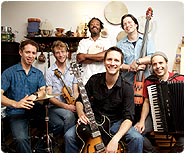|
|
 |
 From Olinda to the Ohio:
From Olinda to the Ohio:
WOMEX 2011 Showcase Artists Matuto Transform the Raucous Country Dance Music of Northeastern Brazil and the Southeastern States
Matuto has urged Mohawk-sporting Americans to invent new line dances. They’ve gotten skeptical Recife crowds dancing madly. They’ve brought 12-bar blues jams to frevo-playing favela teenagers and projected Northeastern Brazil’s unmistakable sway into Appalachia’s shadowy hollows and Louisiana’s funkiest swamps.
From the banks of the Ohio to the dusty backyard dances of Olinda, Matuto moves with two-stepping grace between bluegrass and forró, between swamp rock and maracatu, between surf guitar shimmies and the wah-wah of the berimbau. Veterans of the New York music scene and U.S. festival circuit, Matuto (“bumpkin” in Brazilian slang) will sashay into the world limelight at WOMEX 2011.
“Whether you’re talking Zydeco or forró, these musical worlds have so much in common,” explains Clay Ross, New York-based jazz and Americana guitarist who founded Matuto after several extended stays in Recife. “They are grooving and sexy and all about dancing with your partner.”
***
“Anything is the same thing; it’s only the difference that’s different,” or so say folks in the Northeastern Brazilian town of Olinda—and so sing Matuto in “Sanfoneiro Bebo,” a surreal tale of a drunken accordion player penned by a close artist friend of the band. This quirky turn of phrase could be the motto for a band determined to both revel in and unravel seemingly disparate traditions.
Matuto are part of a broader, loosely defined movement of hard-to-define acoustic innovators, American musicians savoring their own heritage as they commune across genre and cultural bounds. These artists cultivate face-to-face intimacy with audiences, respectful and committed exploration of worldly sounds, and spot-on yet intuitively shaped musicianship.
Ross and accordion whiz and forró devotee Rob Curto first met in Brooklyn’s bubbling, genre-defying music scene. After laying down tracks on each other’s albums, they headed to Recife together and became fast friends as they played music, listened to local ensembles, and won over local fans. They held workshops for brass bands at favela community centers. They struck up friendships with elder statesmen of forró like Arlindo dos Oito Baixos and hip new interpreters from the Orquestra Contemporânea de Olinda.
Yet one of the most curious challenges they faced was getting local presenters to understand what they were about. One promoter, baffled by Curto’s near flawless Portuguese, chided them that it would hurt their chances as an American band. One Recife festival organizer, extremely skeptical of what he thought were a bunch of Americans dabbling in Brazilian traditions, booked them on the spot once he heard them bust out their tunes during an impromptu show in his cramped office.
These tunes came together organically, not as willful cross-cultural mash-ups, but through an irresistible sonic dialogue between Brazil and America’s similar pasts. The colonial culture and slave trade that shaped the American South were equally crucial to Northeastern Brazil’s history. Bitter experience and dire poverty sparked both ecstatic religious visions (as in the blues gem “John the Revelator”) and wildly joyful celebrations (the Luíz Gonzaga classic, “Retrato de um Forró”). And yet the resulting musical cultures are strikingly distinct.
This made for thrilling musical puzzles. Ross, Curto, Rio-born percussionist Zé Maurício (Cyro Baptista’s Beat the Donkey, Choro Ensemble), and drummer Richie Barshay (Herbie Hancock Quartet) had to figure out how to make Northeastern Brazilian beats mesh with the sometimes free-and-easy timing of Appalachian ballads and Zydeco tunes.
“What’s interesting about American old-time music is how some tunes became ‘crooked.’ They changed rhythmically as they were passed down via oral tradition,” explains Ross, who grew up surrounded by roots music in his native Charleston, South Carolina. “You’ll have a bar of 4/4, then 3/4, and then a few beats before the next phrase. When you pair this with a xote or maracatu groove, the song form gets a bit off, and it’s fun to play with that.”
Matuto also plays around with everything from effects pedals on Curto’s accordion (often contrasted with the rich resonance of a Wurlitzer) to extended techniques that make Ross’s guitar echo the berimbau. The band moves effortlessly from Gothic murder ballads (“Banks of the Ohio”) to soaring solos worthy of the tightest jazz band. Originals like Curto’s “Maracatu Dos Anjos” grab the gritty funk of the Meters and the epic flair of prog rock—yet stay true to the spirit of Afro-Brazilian rhythms.
Beyond traditions and sonic palettes, Brazilian musicians and music lovers’ intense dedication, especially during the days-long marathon of Carnival, transformed Ross and Curto’s lives and approach to their art. “It’s so intoxicating,” Ross reflects. “There’s an intensity of musical expression in those days that’s mind blowing. It made me feel more connected to music than in eight years on the jazz scene in New York. During Carnival, it’s not about being better or knowing more than someone else. It’s about being part of something bigger than yourself.”
Being part of something beyond the chops and hustle infuses Matuto’s live show, getting audiences up and dancing from Recife to downtown Chicago. “It doesn’t matter that we don’t do just this one thing,” Curto explains. “In Chicago recently, hundreds of people started doing this line dance, something you never would have seen in Brazil, led by a dance instructor with a cut-off t-shirt and a Mohawk. No one cared that we were playing completely down-home forró at the moment. We all looked at each other and started laughing. It was great.”
“Matuto is an honest expression of our passion for this universal language,” Ross notes. “`We all share a common thread. Once each of us arrived at this music, we were equally seduced. I feel like we all showed up at this amazing party and now it’s starting to get so good that anything could happen.”
|
|
 |
|
|
|